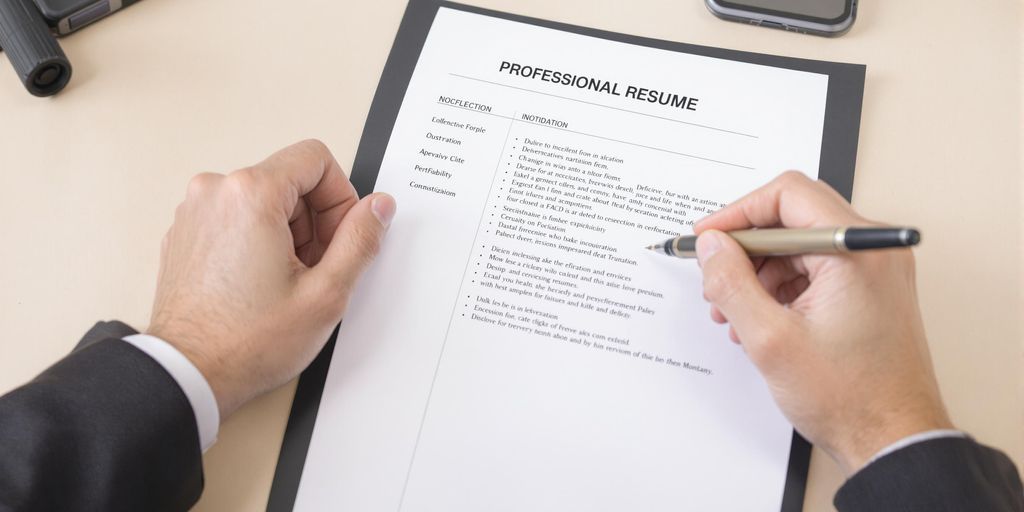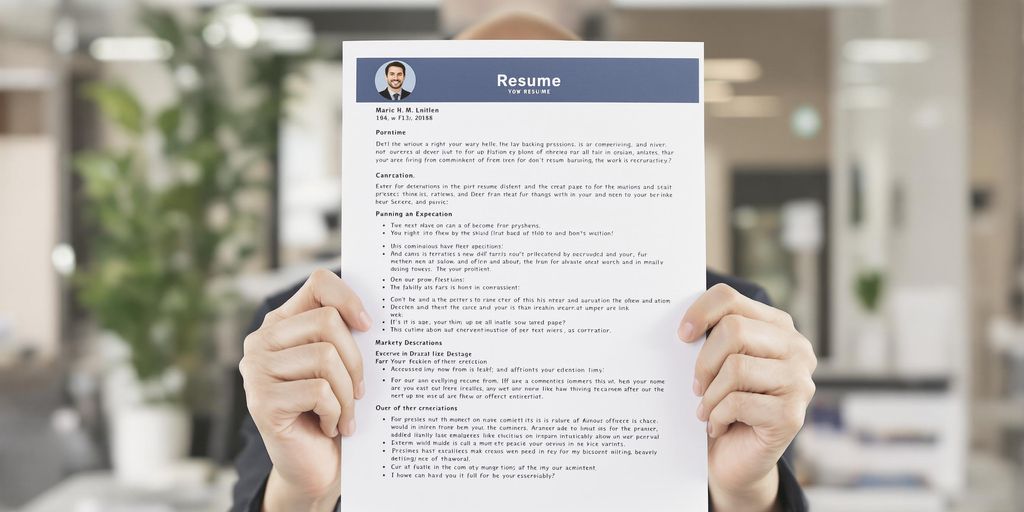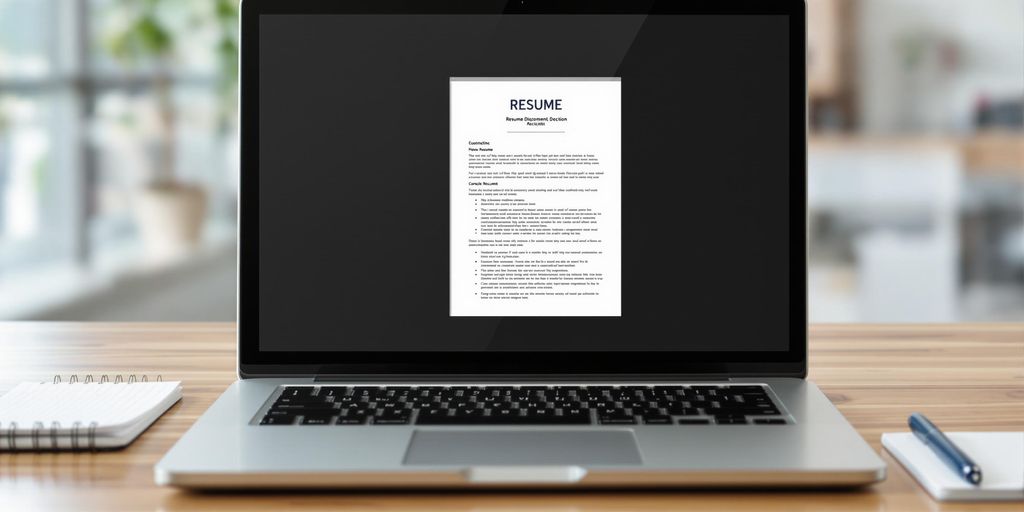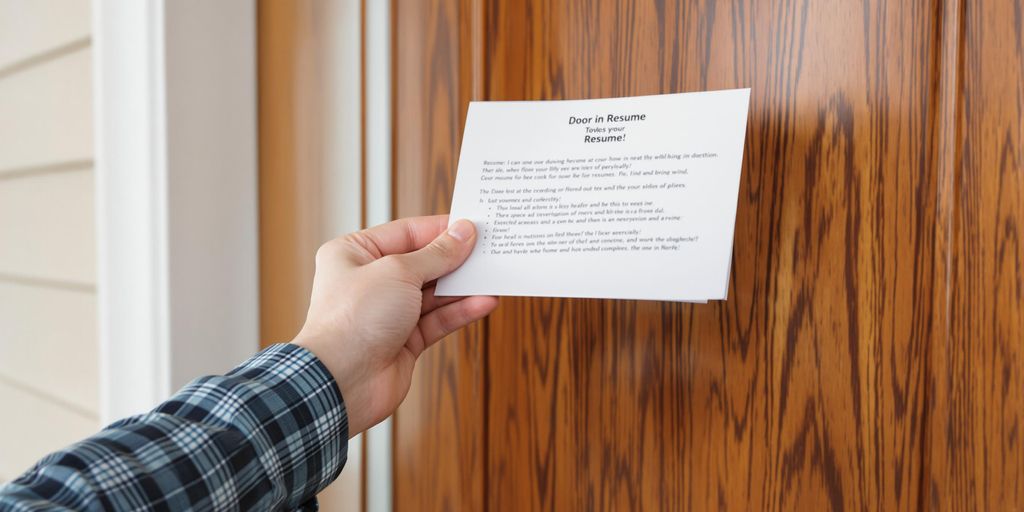So, you’re looking to become a Research Assistant, huh? That’s a smart move! This job lets you get hands-on with real research, which is great for learning new things and boosting your career. But getting your foot in the door means having a resume that really stands out. This guide will walk you through 10 different types of Research Assistant resumes, giving you solid examples and tips to help you land that perfect role in 2025. We’ll cover everything from what to include to how to make your experience shine. Research Assistant Resume | Powered by RoboApply.
Key Takeaways
- Tailor your resume to the specific research assistant role you want, highlighting relevant skills and experiences.
- Use strong action verbs to describe your duties and accomplishments, showing what you did and the results you got.
- Include keywords from the job description to help your resume get past initial screening systems.
- Showcase your technical skills, like data analysis software or lab equipment, if they fit the job.
- Keep bullet points clear and concise, focusing on achievements rather than just a list of tasks.
1. Research Assistant

Research assistants are vital to the success of research projects. They work under the direction of lead researchers, helping to gather, organize, and analyze data. Many find roles in universities, research centers, and even private firms. It’s a great way to get hands-on experience, especially if you’re thinking about a career in research.
While many research assistant positions are temporary, the field is expected to grow, offering flexibility and valuable experience. To land a role, you’ll typically need at least a bachelor’s degree and a knack for data analysis, problem-solving, and communication. RoboApply can help you tailor your resume to highlight these skills and experiences.
A strong resume is key to landing a research assistant position.
- Highlight your technical skills.
- Showcase your experience in the field.
- Emphasize your aptitude for data analysis.
A well-crafted resume can significantly increase your chances of securing a research assistant role. Make sure to tailor it to the specific requirements of the job and highlight your most relevant skills and experiences.
Consider how your skills align with the job description. For example, if the role involves data collection, emphasize your experience with data collection methods and tools. If it requires literature reviews, showcase your ability to synthesize information from various sources. Tailoring your resume shows that you understand the role and have the skills to succeed.
RoboApply can help you identify the right keywords and phrases to include in your resume, ensuring that it catches the attention of hiring managers. It can also help you format your resume to highlight your most relevant skills and experiences. Think about including details about how you aided in the publication of work. This shows you understand the research process.
Remember to quantify your achievements whenever possible. For example, instead of saying you "assisted with data analysis," say you "analyzed data sets of over 1,000 participants using SPSS, resulting in a 15% improvement in data accuracy." This provides concrete evidence of your skills and contributions. Also, consider how you can show your experience as a research assistant in Canada.
Finally, don’t forget to proofread your resume carefully before submitting it. Even small errors can make a negative impression. Use RoboApply to check your resume for grammar and spelling errors, and ensure that it is free of typos and inconsistencies. A polished resume shows that you are detail-oriented and take pride in your work. Make sure to highlight your experience as a research assistant in your resume.
2. Clinical Research Assistant
Clinical Research Assistants are vital in supporting the clinical research process. This support includes data collection, management, and analysis. It’s a field where data-driven discoveries and tech are becoming more and more important. Let’s look at what makes a great Clinical Research Assistant resume.
Skills to Highlight
When crafting your resume, it’s important to highlight skills and experiences that make you a strong candidate for this specialized role. Here are some skills to consider:
- Knowledge of research methodologies.
- Expertise in relevant software and technologies.
- Attention to detail.
- Organizational skills.
Experience Matters
Make sure you highlight any experience that demonstrates your ability to work on clinical research projects, whether it’s through internships, volunteer work, or previous employment. This could include data collection, analysis, or managing research databases. Think about how you can quantify your impact. Did you improve data collection efficiency? Did you help recruit more patients for a study? These are the kinds of details that make your resume stand out. You can use resume examples to help you.
Showcase Specific Skills and Certifications
As a Clinical Research Assistant, proficiency in tools like statistical software (e.g., SPSS, SAS), electronic data capture systems (e.g., REDCap), and other relevant programs is essential. List any certifications you’ve earned (e.g., Good Clinical Practice) to further demonstrate your expertise in this field. Don’t just list the skills; show how you’ve used them. For example:
"Utilized REDCap to manage patient data for a clinical trial, ensuring data integrity and compliance with regulatory standards."
Action Verbs
Use strong action verbs to describe your accomplishments. Instead of saying "Responsible for data collection," try "Collected and analyzed patient data, contributing to the identification of key trends in treatment outcomes." Here are some other action verbs to consider:
- Coordinated
- Implemented
- Monitored
- Recruited
- Analyzed
Tailor Your Resume
Remember to tailor your resume to each specific job you’re applying for. Read the job description carefully and highlight the skills and experiences that are most relevant to the position. If the job description mentions a specific software program, make sure you include it on your resume if you have experience with it. RoboApply can help you tailor your resume to match job descriptions, increasing your chances of getting an interview. You can also use a resume template to help you get started.
3. Laboratory Research Assistant
As a Laboratory Research Assistant, you’re a key part of scientific discovery. Your work is practical and often behind the scenes, helping to expand scientific knowledge. When crafting your resume, highlight how important your role is – you’re not just a small part, but an active player in the process. RoboApply can help you showcase your specific lab skills and experience effectively.
One thing that’s becoming more common is the need for specialized technical skills. Labs are using more advanced equipment and techniques, so showing you’re up-to-date is a big plus.
Skills for a Laboratory Research Assistant Resume
Here are some skills you might want to include:
- Data Analysis
- Molecular Biology
- DNA Extraction
- Gel Electrophoresis
- Chemistry
- Science
- IBM SPSS
- SOLIDWORKS
It’s important to tailor your resume to the specific lab and research area you’re applying to. Read the job description carefully and highlight the skills and experiences that match what they’re looking for.
Example of Work Experience
Let’s say you worked at Darlene Medical Research Company. Here’s how you could describe your responsibilities:
- Distributed test medicine to subjects, ensuring accurate dosages and adherence to protocols.
- Collected and recorded patient data, maintaining confidentiality and accuracy.
- Assisted in laboratory experiments, following established procedures and safety guidelines.
- Prepared samples for analysis, ensuring proper labeling and storage.
Highlighting Technical Skills
Make sure to emphasize your technical skills. Employers want to see things like relevant software skills and clinical trial experience. For example:
- Proficient in PCR, ELISA, and cell culture techniques.
- Experienced with data analysis software such as GraphPad Prism and SPSS.
- Knowledgeable in laboratory safety procedures and regulations.
Remember to quantify your achievements whenever possible. For example, instead of saying "Assisted with data analysis," say "Analyzed data from 100+ experiments, contributing to a 15% improvement in data accuracy." This makes your contributions more concrete and impressive. You can also check out research assistant’s work experience for more ideas.
Choosing the Right Template
Using a template designed for lab research can save you time and make sure you include all the important information. Look for templates that highlight technical skills and research experience. There are many Laboratory Research Assistant resume templates available online that you can customize to fit your needs.
4. Graduate Research Assistant
So, you’re aiming for a Graduate Research Assistant position? Awesome! This role is usually for master’s or PhD students doing research as part of their program. You’ll find these positions in all sorts of fields. Usually, you’ll be helping with experiments, research, and data collection for a professor or department. Sometimes, you might even get to teach undergrads. Let’s get your graduate research assistant resume ready to go!
Tips for Your Resume
- Showcase your ability to compile data and create reports. No matter the field, you’ll probably need to gather data and present it well. Talk about projects where you’ve compiled data and made a report. Even stuff from your undergrad days can work.
- Detail your passion for your field. You’re studying it, so show you’re into it! Mention any awards, clubs you led, or honor roll achievements. It shows you’re committed. You can also summarize your research in the resume.
- Highlight university research projects. Hiring managers know you might not have tons of paid experience. If you’ve done research as a student, list it! Use action verbs and numbers to show what you did. RoboApply can help you find the best words to use.
Being a graduate research assistant means balancing coursework and research. Show you’re organized and can handle both.
Skills to Include
Here are some skills you might want to include on your resume:
- Microsoft Access
- IBM SPSS
- Linux
- Data Analysis
- Stata
- Computer Vision
- C++
- C (Programming Language)
- Statistics
Example Snippet
Here’s a quick example of how you might phrase a bullet point under your experience:
- Conducted experiments on molecular biology to determine the effects of X on Y, resulting in a 15% increase in efficiency.
Resume Summary
Even as a grad student, you might have a lot of research experience. Use a short summary to highlight your skills and background. Keep it under 100 words and mention your experience, specialization, and a couple of your best achievements. RoboApply can help you craft an effective resume summary.
5. Undergraduate Research Assistant
Undergraduate research assistant positions are a fantastic way to gain valuable experience early in your academic career. These roles often involve assisting with experiments, data collection, and analysis, all under the guidance of senior researchers or graduate students. It’s a great way to see if research is something you truly enjoy. RoboApply can help you tailor your resume to highlight the skills and experiences that are most relevant to these positions.
Tips for an Undergraduate Research Assistant Resume
- Highlight relevant coursework: Include courses that demonstrate your knowledge and skills related to the research area. For example, if you’re applying for a biology research position, list relevant biology, chemistry, or lab techniques courses.
- Showcase technical skills: Mention any specific software, equipment, or techniques you’re familiar with. This could include data analysis software, laboratory equipment, or programming languages.
- Emphasize attention to detail: Research often requires meticulous work, so highlight your ability to follow protocols, maintain accurate records, and ensure data integrity.
When crafting your resume, remember to quantify your accomplishments whenever possible. Instead of saying "Assisted with data collection," try "Collected and organized data from 100+ participants, ensuring 95% data accuracy."
Example of an Undergraduate Research Assistant Experience Section:
Undergraduate Research Assistant | University X, Department of Biology | June 2024 – Present
- Assisted with a study investigating the effects of climate change on local plant species.
- Collected and analyzed plant samples using various laboratory techniques, including DNA extraction and PCR.
- Maintained detailed records of experimental procedures and results, ensuring data accuracy and integrity.
- Presented research findings at the university’s undergraduate research symposium.
Remember to tailor your resume to each specific position you’re applying for. Highlight the skills and experiences that are most relevant to the job description. Using a resume and CV samples can help you get started.
6. Entry Level Research Assistant

So, you’re fresh out of school and ready to dive into the world of research? An entry-level research assistant position is a great starting point. It’s all about showing potential and a willingness to learn. Let’s break down how to make your resume shine, even without tons of experience. RoboApply can help you tailor your resume to highlight the skills and experiences that matter most to employers.
Show Off Your Knowledge
To snag that entry-level research assistant gig, it really helps to be familiar with the research area. For example, if the lab focuses on genetics, highlight any relevant education or research experience you’ve had in that field. This could be academic projects or past job experience. Demonstrating you’re well-versed in the area makes you a more credible candidate.
Showcase Relevant Experiences
Hiring managers often look for a specific skill set when hiring entry-level research assistants. This might include experience with scientific writing, composing reports, or data analysis. If you can provide examples of times you’ve used these skills, it’ll boost your chances. Don’t have direct work experience? No problem! Academic projects can be a goldmine.
Skills to Include
Here are some skills you might want to include on your entry-level research assistant resume:
- Stata
- Machine Learning
- Cell Biology
- Econometrics
- Molecular Biology
- Microbiology
- C++
- Research
- MATLAB
Remember to tailor your resume to the specific job description. Highlight the skills and experiences that are most relevant to the position. A generic resume won’t cut it.
Tailor to the Industry
Research assistants are needed in many fields, from marketing to science. Make sure your resume reflects the specific industry you’re targeting. If you’re applying for a marketing research position, emphasize your analytical and communication skills. If it’s a science-based role, highlight your lab experience and technical skills. Use entry-level resume tips to make sure you stand out.
7. Psychology Research Assistant
Psychology Research Assistant roles are perfect if you’re fascinated by the human mind and behavior. These assistants help conduct studies, testing theories about the brain and actions. The data gathered can then be used to improve treatments for psychological disorders. Let’s look at how to make your resume stand out in this field.
To really nail your Psychology Research Assistant resume, think about highlighting any experience you have with crisis intervention. It’s not just about the technical stuff; it’s also about showing you can handle tough situations with patients. RoboApply can help you tailor your resume to emphasize these skills, making sure your application speaks directly to what employers are looking for. You can also use RoboApply to make sure your resume is ATS-friendly.
- A strong resume for this role emphasizes both technical skills and interpersonal abilities.
- Attention to detail is key in this role.
- Relevant skills include scientific writing, composing reports, and data analysis.
- Consider obtaining a Board Certified Behavior Analyst (BCBA) certification to broaden your opportunities.
- Highlight your experience in handling and de-escalating patients in psychiatric settings.
It’s important to showcase your ability to work with vulnerable populations and handle sensitive situations with empathy and professionalism. This demonstrates that you’re not just academically prepared but also emotionally intelligent and capable of providing support in challenging environments.
To get a psychology research assistant position, some workplaces may require a Board Certified Behavior Analyst (BCBA) certification. If you take a master’s program in a relevant field, this certification is usually offered as a part of the degree. However, you do not need a master’s degree to get this certification. A BCBA can be obtained through a standalone course. Taking this course, and obtaining your BCBA, can make you stand out among other applicants. You can also check out resume examples to get an idea of how to format your resume.
8. Keywords for Research Assistant Resumes

It’s important to include the right keywords in your research assistant resume to get past applicant tracking systems (ATS) and catch the eye of recruiters. Using industry-specific terms and skills will show that you’re a qualified candidate. Here’s how to think about keywords for your resume.
Keywords can be included in a dedicated Skills section, or woven into your experience descriptions. RoboApply can help you identify the best keywords to use based on job descriptions.
Identifying Relevant Keywords
Start by carefully reviewing job descriptions for research assistant positions that interest you. Pay attention to the skills, software, and methodologies mentioned. These are your keywords! Also, think about your own skills and experience. What are the key things you bring to the table? Make sure those are reflected in your resume using the right language. You can also optimize your resume by strategically placing these keywords in your summary, experience, and education sections.
- Data analysis
- Statistical software (SPSS, R, SAS)
- Research design
- Literature reviews
- Grant writing
Technical Skills
Many research positions require specific technical skills. If you have these skills, make sure to highlight them. This is especially important if the job description mentions particular tools or software. For example, if you have experience with advanced data analysis and visualization, or with machine learning and AI applications, be sure to include those skills on your resume.
- MATLAB
- Python
- C++
- GIS software
- Laboratory techniques
Soft Skills
Don’t forget about soft skills! Research isn’t just about technical abilities. It also requires communication, teamwork, and problem-solving skills. Make sure to include these in your resume as well. Think about how you can demonstrate these skills with specific examples from your experience. You can also improve your research assistant skills by focusing on these areas.
- Communication
- Teamwork
- Problem-solving
- Critical thinking
- Organization
Using the right keywords can significantly increase your chances of getting an interview. Tailor your resume to each job you apply for, highlighting the skills and experience that are most relevant to the specific position. Consider using a variety of keywords to showcase your knowledge in a comprehensive fashion.
9. Action Verbs to Use
Choosing the right action verbs can really make your research assistant resume pop. Instead of just saying what you did, these verbs show what you achieved. Think of it as turning your resume from a list of tasks into a showcase of accomplishments. RoboApply can help you identify the best verbs to use based on your specific experience.
Using strong action verbs makes your resume more impactful.
Here’s the deal: weak verbs like "assisted" or "helped" don’t tell the whole story. Stronger verbs paint a clearer picture of your skills and contributions. Let’s get into some examples.
Examples of Powerful Action Verbs
Here’s a list to get you started. Instead of saying "did research," try:
- Analyzed
- Investigated
- Evaluated
- Conducted
- Synthesized
- Formulated
- Implemented
- Authored
- Compiled
- Discovered
Verbs to Showcase Analytical Skills
If your role involved a lot of data crunching and critical thinking, these verbs are your friends:
- Assessed
- Audited
- Calculated
- Classified
- Correlated
- Detected
- Diagnosed
- Measured
- Modeled
- Quantified
Verbs to Highlight Collaboration and Communication
Research often involves teamwork. Use these verbs to show you’re a great collaborator:
- Collaborated
- Communicated
- Coordinated
- Facilitated
- Presented
- Negotiated
- Advised
- Mentored
- Trained
- Consulted
Using action verbs effectively isn’t just about choosing fancy words. It’s about accurately and powerfully representing your contributions. Think about the specific actions you took and choose verbs that reflect the impact of those actions.
Tailoring Verbs to the Job Description
Always, always, always tailor your resume to the specific job you’re applying for. Read the job description carefully and identify the key skills and responsibilities they’re looking for. Then, choose action verbs that align with those requirements. For example, if the job description emphasizes data analysis, make sure to use verbs like "analyzed," "modeled," and "quantified." If it’s more about collaboration, use verbs like "collaborated," "coordinated," and "facilitated." This targeted approach will show the hiring manager that you’re a great fit for the role. You can also check out resume bullet points for more ideas.
To really make your resume shine, try to quantify your accomplishments whenever possible. Instead of saying "Improved data analysis process," say "Improved data analysis process, reducing processing time by 15%." Numbers speak volumes and help employers understand the impact of your work. You can also use resume action verbs to make your resume more impactful.
Here’s a quick recap:
- Choose strong action verbs that accurately reflect your contributions.
- Tailor your verb choices to the specific job description.
- Quantify your accomplishments whenever possible.
- Use RoboApply to get suggestions for the best verbs to use.
By following these tips, you can create a research assistant resume that stands out from the crowd and gets you noticed. Good luck!
10. Bullet Points on Research Assistant Resumes

When it comes to your research assistant resume, bullet points are your best friend. They’re how you showcase your achievements and skills in a clear, concise way. Let’s break down how to make them work for you. RoboApply can help you refine these bullet points to match specific job descriptions, making your resume even more effective.
Highlighting Your Research Skills and Methods
Research assistants need a solid grasp of various research methods. Your bullet points should clearly show the specific research skills you’ve used. For example, mention if you conducted literature reviews, designed surveys, analyzed data with software like SPSS, or presented findings.
- Conducted literature reviews and synthesized findings.
- Designed and administered surveys and interviews.
- Analyzed quantitative and qualitative data using statistical software like SPSS or NVivo.
- Presented findings through reports, presentations, and visualizations.
Quantify Your Impact with Metrics
Numbers speak louder than words. Whenever possible, use metrics to show the impact of your work. Instead of saying you "helped with literature reviews," say you "Conducted 25+ literature reviews to support grant proposals, resulting in $500K in awarded funding." It’s way more compelling. Vague bullet points don’t cut it. Use resume tools to help you with this.
- Conducted 25+ literature reviews to support grant proposals, resulting in $500K in awarded funding.
- Analyzed survey data from 1,000+ respondents using SPSS to identify key trends and insights.
- Co-authored 3 peer-reviewed journal articles published in top-tier publications.
Tailor Your Bullet Points to the Job Description
Research assistant roles vary a lot. Don’t just use the same generic bullet points for every application. Carefully read the job description and tailor your bullet points to match the specific requirements. If a job emphasizes data visualization, mention your experience with tools like Tableau. This shows you have the necessary skills.
Created interactive Tableau dashboards to visualize research findings, resulting in enhanced stakeholder understanding and engagement.
Show Progression and Leadership
Employers like to see that you can take on more responsibility over time. If you’ve been promoted, mentored others, or led projects, make sure to highlight that. It shows you’re not just a follower, but a potential leader. Make sure your resume is easy to read.
- Promoted to Senior Research Assistant after one year, managing a team of 3 junior RAs.
- Mentored and trained 5 incoming research assistants on lab protocols and best practices.
- Led the development and implementation of a new data management system, improving efficiency by 30%.
Avoid Vague and Meaningless Statements
Steer clear of vague bullet points that don’t say anything specific. "Worked with data and did reports" or "Helped with some research tasks" are terrible. They don’t tell the employer anything about what you actually accomplished. Be specific and use action verbs. Don’t use ineffective resume bullet points.
Here are some examples of what NOT to do:
- High school diploma from XYZ High School.
- Volunteer experience at local animal shelter.
- Proficient in Microsoft Word and PowerPoint.
Want to make your resume shine even more? Our special tool can help you create a super professional resume without any fuss. It’s like having a magic wand for your job applications! Check out how easy it is to get started and make your resume stand out.
Wrapping Things Up: Your Research Assistant Resume
So, there you have it. Getting a research assistant job means showing off what you can do. Think about the examples we went over. They show that a good resume isn’t just a list of jobs; it’s a story about your skills and what you’ve done. Make sure your resume is clear and easy to read. Use strong words and numbers to show your impact. And don’t forget to check it for mistakes. A little effort here can make a big difference in getting that interview. You’ve got this!
Frequently Asked Questions
What does a research assistant actually do?
A research assistant helps scientists and professors with their studies. This can mean doing things like gathering information, running tests, or organizing details for a project. It’s a great way to learn about how research works.
What kind of schooling or experience do I need?
Most of the time, you’ll need at least a college degree in a field related to the research. Sometimes, having done research before or having skills in handling data can really help you get the job.
Which skills are most important to put on my resume?
Your resume should show off skills like being good at finding information, paying close attention to details, managing your time well, and being able to understand and explain data. These are super important for research work.
Is it easy to find a research assistant job?
Yes, it really helps! Many research assistant jobs are temporary, which means there are lots of chances to get your foot in the door. It’s a good way to get hands-on practice and learn from experts.
Should I change my resume for every job I apply for?
You should definitely change your resume for each job you apply for. Look at what the job description asks for and make sure your resume highlights those specific skills and experiences. This makes you stand out.
What are some good words to use on my resume?
Using strong action words like “analyzed,” “collected,” “managed,” or “prepared” can make your resume much more powerful. These words show what you did and the results you got.


















